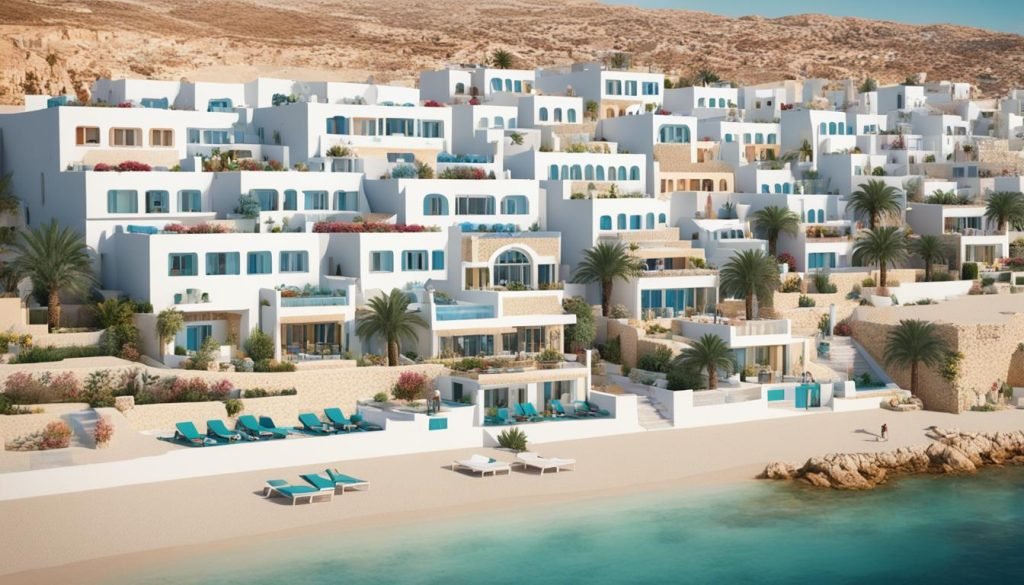Walking through Tunisia’s sunny alleys brings me joy. The air is filled with jasmine and the sea’s scent. This North African treasure’s warmth goes beyond its weather. It’s in the inviting locals, their mint tea, and the colourful market bargains. Yet, a question remains for visitors: Can Unmarried Couples Live Together In Tunisia? For those like me, who value free exploration with a partner, it’s crucial to know Tunisian laws.
I’ve researched what it’s like for unmarried couples in Tunisia. Online forums are filled with differing experiences. Some talk of challenges, others of easy living. Yet, all desire to respect and understand this unique culture. In a place where old meets new, understanding local customs and laws is important. This is for anyone dreaming of a life in Tunisia with their loved one.
Key Takeaways
- Understanding the intricacies of Tunisian cohabitation regulations.
- Analyzing legal and social perspectives on unmarried couples living together in Tunisia.
- Appreciating the nuances of local customs and how they impact cohabitation.
- Educating on the potential legal implications for cohabiting without marital status in Tunisia.
- Harmonising love and partnership with the cultural heartbeat of Tunisia.
Understanding the Legality of Cohabitation in Tunisia
Exploring Tunisian cohabitation laws has been an insightful journey. The legal framework here is complex. Unmarried couples living together is not directly forbidden by Tunisian laws. Yet, social traditions and some legal interpretations might suggest otherwise.
The Current Legal Status of Unmarried Couples
The legal status for unmarried couples in Tunisia shows a grey area. There’s no outright ban on cohabitation. But societal norms can strongly influence the laws’ application and perception.
For those thinking about living together, caution is advised. Knowing the local customs is key, as it affects your experience greatly.
Comparison with Marriage Laws
Comparing cohabitation to marriage in Tunisia reveals clear differences. Married couples get legal rights and protections not available to those who are unmarried and living together. This contrast highlights the importance of considering legal benefits before deciding against marriage.
| Legal Consideration | Married Couples | Cohabiting Partners |
|---|---|---|
| Property Rights | Codified and enforceable by law | Ambiguously defined, typically informal |
| Inheritance Rights | Recognised and protected | Unrecognised unless stipulated in a will |
| Healthcare Decisions | Next-of-kin status usually grants decision-making | Lacks statutory next-of-kin rights |
| Child Custody | Legally determined rights and responsibilities | Subject to the discretion of family courts, less clarity |
So, it’s key to understand fully cohabitation laws and social customs in Tunisia before making the choice to live together. This will help anyone planning to cohabit in this culturally rich country.
Navigating Tunisian Social Norms for Unmarried Partners
Travelling through Tunisia, I’ve realised it’s important to respect local norms, especially as an unmarried couple. Cultural rules, like living together, shape our experience in this lively country. We need to move carefully to enjoy our stay without issues.
Cultural Expectations and Hospitality
I’ve noticed Tunisians are incredibly welcoming, offering kindness freely. But there’s a fine line for unmarried couples. Even though living together isn’t illegal, local values are more traditional. It feels like our private life merges with social expectations here.
Public Perception of Unmarried Couples
People often look closely at couples who aren’t married. In some places, traditions affect how people see us. To avoid awkward situations, I try to fit into Tunisia’s cultural scene. It’s about being careful and respecting the social norms here.
Whether you plan to stay a while or just visit, it’s key to understand how people see unmarried couples. Learn from the locals to feel fully welcomed.
| Region | Perception Concept | Advice for Unmarried Couples |
|---|---|---|
| Urban Centres (e.g. Tunis, Sfax) | More liberal and cosmopolitan attitude | Typically more relaxed, but discretion still advised |
| Coastal Tourist Areas | Accustomed to foreigners, lenient | Enjoy the locale, but respect public decency norms |
| Rural and Inland Regions | Traditional and conservative outlook | Maintain a modest profile in line with local expectations |
In conclusion, if you’re navigating this situation in Tunisia, move with cultural empathy. This approach respects Tunisian customs and helps avoid problems in your journey.
Accommodation Options for Unmarried Couples in Tunisia
As a travel journalist, I’ve dived deep into unmarried couples housing rights. My focus has been on accommodation for unmarried couples in Tunisia. Many wonder if they can stay together in a hotel if they’re not married. Through research and talking to accommodation providers, I’ve found a range of practices.
In many parts of Tunisia, there’s a kind of unspoken acceptance. Not all places are strict about couples sharing a room. Still, it’s wise to check with hotels beforehand. This can avoid any awkward moments when you arrive.
Many places in Tunisia have warmly welcomed me and my partner, no questions asked. This really shows the kind hospitality of Tunisian culture.
Big international hotels often cater to global visitors. They tend to be more open about guests’ marital status. But smaller, family-run places might stick closely to Tunisian traditions. They can be more conservative.

Key Takeaways for Unmarried Partners Seeking Accommodation in Tunisia:
- Always check the hotel’s policy on unmarried couples to be sure.
- Choosing larger hotels or resorts might give you a smoother stay.
- If you want a unique experience, pick smaller accommodations wisely. Make sure they fit your needs around unmarried couples housing rights in Tunisia.
- Being respectful and sensitive to local customs can make your trip better and avoid trouble.
To sum up, finding accommodation for unmarried couples in Tunisia looks promising. Trends and feedback from travellers are positive. But, always double-check to make your stay comfortable and respectful of Tunisian culture.
Rights and Limitations for Unmarried Couples
In Tunisia today, societal views on relationships are slowly changing. Conversations now often include the topic of unmarried partners living together in Tunisia. Yet, the legal protection for cohabitation in Tunisia hasn’t fully caught up with these new social trends. This shows a gap in Tunisia’s laws.
Housing Rights Without Matrimony
Living together without being married brings its own set of challenges, especially when finding a place to live. Married couples enjoy clear rights regarding property and renting. But, those not married face a lot of uncertainties. The law doesn’t directly stop unmarried partners living together in Tunisia. However, they might find it hard to deal with housing issues or contracts.
Legal Protection for Cohabiting Partners
The topic of legal protection for cohabitation in Tunisia is quite new. Mixing legality with social acceptance, non-married couples don’t have a strong footing. They miss out on benefits married couples get, such as healthcare and dealing with debts. This lack of legal support covers many areas, highlighting the importance of understanding Tunisian law.
Here is a table showing the differences in rights between married couples and cohabiting partners in Tunisia:
| Legal Rights | Married Couples | Cohabiting Partners |
|---|---|---|
| Property Ownership | Jointly recognised with clear laws | Ambiguous without marital status |
| Rental Agreements | Legal entitlements and protection | Rights often undefined and uncertain |
| Financial Liabilities | Shared responsibilities under law | Varies, often unaddressed in legislation |
| Healthcare Access | Access as family members ensured | Limited or no recognition as dependents |
It’s vital for all couples, especially those from abroad thinking of sharing a life in Tunisia without marrying, to know the laws and rights they have, or might not have.
Travel Advisaries and Considerations in Tunisia
Exploring Tunisia requires being up-to-date with travel advisories for unmarried couples. I aim to offer you the latest, understanding safety is key. As a traveller, knowing local conditions and rules is vital, especially with your partner if you’re not married.
Remember, advisories can vary by region and might change your plans. Whether it’s near borders or in the Sahara, stay informed for safety and enjoyment.
Security Measures at Borders and Checkpoints
Travel between Tunisia and neighbours like Libya and Algeria has tight security. Unmarried couples need to be aware of this. They’ll face document checks at military and police stops. Although designed for everyone’s safety, be ready with ID and answers about your stay in Tunisia.
Access to Desert Areas and Required Permissions
Planning for desert adventures in Tunisia means getting permission first. The Sahara’s beauty comes with challenges like navigating and security. For unmarried couples, a guide is not just advice, but a requirement in many advisaries.
Following these guidelines and getting the right permissions reduces risks. It ensures your desert journey is as safe as it is stunning.
Lastly, understanding and following Tunisian travel advisaries is crucial, particularly for unmarried couples. By being prepared, you’ll ensure a safe and memorable trip in Tunisia.
Driving and Road Safety for Visitors in Tunisia
Planning to drive on Tunisian roads means you need to be well-prepared. You will face busy city traffic and quiet rural areas. It’s vital to have an International Driver’s Permit to follow the law and ensure a smooth journey.

Obtaining an International Driver’s Permit
Before driving in Tunisia, getting an International Driver’s Permit is crucial. This permit translates your home licence. It’s recognised in many countries, including Tunisia. Not having it could lead to fines and trouble if there’s an accident.
Local Road Conditions and Driving Etiquette
Driving in Tunisia means dealing with varied road conditions. You’ll see poorly kept vehicles and driving styles different from the UK. Bad street lights also make driving at night riskier.
| Road Aspect | Consideration | Advice |
|---|---|---|
| Road Maintenance | Variable conditions, potholes common | Maintain vigilance and reduce speed accordingly |
| Driving Practices | Often aggressive, disregard for traffic rules | Stay calm, allow extra time for journeys |
| Night-Driving | Poor lighting, increased accident risk | Avoid driving at night if possible |
| Local Drivers | Unpredictable behaviour, ignored pedestrian crossings | Remain attentive and anticipate sudden moves |
Knowing the local road rules is key when driving in Tunisia. Understanding local customs and keeping your International Driver’s Permit with you will make your drive safer and more enjoyable in this exciting country.
Choosing Safe and Reliable Transport Methods
When travelling in Tunisia, my goal is to explore safely and without worries. I aim to make the most of transport options in Tunisia for safe travel in Tunisia. This means learning how to navigate from bustling cities to peaceful coastal towns efficiently.
Using Taxis and Public Transport Services
For getting around, I count on official taxis. These can be spotted by their clear signs. It’s crucial to ensure the taxi has a meter or to fix a price before starting. For buses and trains, choosing trusted companies is wise. They might get crowded, so watching your stuff is essential.
Ensuring Safe Rail and Sea Travel
Trains in Tunisia offer a unique view of the country’s scenery, linking big cities. Always watch your bags on trains to dodge theft. Ferries offer a calm way to travel to islands like Djerba or Kerkennah. They run regularly and are dependable.
Having a great time in Tunisia means knowing how to travel smartly. Being informed about transportation and focusing on safety makes any trip better.
Experiences of Foreign Unmarried Couples in Tunisia
My focus now shifts to the experiences of living together in Tunisia. These tales come from foreigners who’ve lived as couples without being married. They share what it’s like, showing the good things waiting for those coming to Tunisia together but not wed.
As we travelled Tunisia, we felt a warm welcome, even though we weren’t married. The culture was as welcoming as the vast Saharan sands.
Finding a place to stay is often a worry for couples living together. But, in Tunisia, places to stay tend to focus on making your visit nice. They don’t make a big deal about whether guests are married.
The table below shows true stories from couples who’ve made Tunisia their temporary home. These stories highlight how visiting Tunisia as an unmarried couple is seen by others.
| Accommodation | Public Spaces | Local Interaction | |
|---|---|---|---|
| Experiences | No issues with sharing rooms | Discretion advised in affection | Warmth despite relationship status |
| Expectations | Respect for privacy | Observance of local customs | Engagement in cultural exchange |
| Preparation | Verification of hotel policies | Awareness of conservative areas | Learning basic Arabic or French |
To wrap things up, these stories confirm something important. Respecting the local ways and heritage makes your visit smooth. Tunisia’s fairly open-minded view of tourists living together lets couples enjoy their stay. They don’t have to worry too much about not being married.
Exploring Tunisian Culture: Tips for Travelling Couples
Diving into Tunisian culture is amazing for couples. It’s full of wisdom and unique scents. I often recommend they try sharing Tunisian dates and mint tea. This shows Tunisia’s rich culture and welcoming nature. Sharing these moments can make your trip memorable.
It’s smart to know some travel tips before exploring Tunisia. For example, learn to haggle respectfully with vendors. This can get you a special souvenir that reflects your journey. It also lets you see an important part of Tunisian culture.
Respecting local customs is key when travelling in Tunisia. Dress appropriately and act modestly, especially in sacred places. This shows you respect their culture. It makes your trip smoother and ensures Tunisians welcome you warmly.







